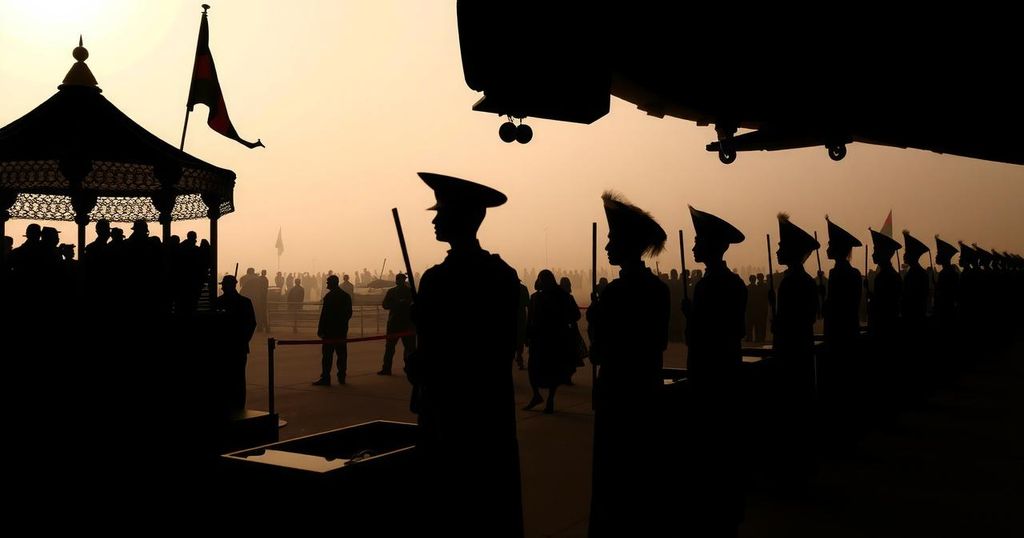The remains of 42 South African freedom fighters have been returned from Zimbabwe and Zambia, marking an important step in addressing the historical injustices experienced during the apartheid struggle. The repatriation aims to provide closure to the families of the deceased and educate future generations about their contributions. Notable figures such as Duma Nokwe and Florence Mophosho were among those returned. A ceremonial welcome is planned, with further repatriations expected from other countries.
On Wednesday, the remains of 42 South African freedom fighters, who perished in exile while opposing apartheid, were returned to their homeland, according to officials. The bodies were ceremoniously received at Waterkloof Air Force Base in Pretoria by governmental representatives and the fighters’ families following their exhumation from burial sites in Zimbabwe and Zambia. This repatriation is part of a broader government initiative aimed at providing closure to families whose relatives met their demise far from home while affiliated with the underground movements of both the African National Congress (ANC) and the Pan Africanist Congress (PAC). Historically, before the end of apartheid in 1994, numerous activists had fled South Africa to undergo military training abroad, with intentions to return and initiate an armed insurrection. Many sought refuge in Zimbabwe and Zambia, where resistance infrastructures were relatively robust, to evade arrest by the apartheid authorities. Notably, when the ANC was outlawed in South Africa, it relocated its headquarters to Lusaka, the capital of Zambia. Regrettably, many of these activists succumbed while in exile and were laid to rest in these foreign nations. Among those whose remains were returned were prominent figures in the struggle against apartheid, such as Duma Nokwe, Florence Mophosho, and Basil February. During a Heritage Day event on Tuesday, South Africa’s Deputy President Paul Mashatile emphasized the importance of this repatriation, declaring it integral to educating future generations about the contributions of these freedom fighters to the anti-apartheid movement. Mashatile stated, “As a national memory project, this initiative aims to commemorate, celebrate, educate, promote, preserve, conserve, and provide a durable testament to South Africa’s road to freedom.” A ceremonial welcome is to be officiated by President Cyril Ramaphosa on Friday, after which the remains will be entrusted to the respective families for reburial across South Africa. Additionally, there are ongoing efforts by the government to repatriate the remains of more South Africans from various countries, including Lesotho, Ethiopia, Tanzania, Angola, and Russia. Deputy Defense Minister Bantu Holomisa remarked, “I hope this process will culminate in getting more people in other countries who died under difficult conditions. We welcome them back to connect with their families.”
The repatriation of the remains of South African freedom fighters highlights the historical context of the anti-apartheid struggle. Many activists took refuge in neighboring countries such as Zimbabwe and Zambia after facing oppression, arrest, or harassment at the hands of the apartheid regime. The ANC and PAC played crucial roles in resisting apartheid, and many members of these organizations sought military training abroad to bolster their fight for liberation. This event is part of an ongoing effort to recognize their sacrifices and provide closure to the families left behind. The return of the remains is not merely a repatriation of bodies; it symbolizes the acknowledgement of struggles endured and the lives lost in the battle for freedom.
The return of the remains of 42 South African freedom fighters who died in exile serves as a poignant reminder of the sacrifices made during the anti-apartheid struggle. This initiative aims to provide closure to numerous families and educate future generations about the pivotal role these individuals played in shaping South Africa’s history. The broader effort to repatriate the remains of others who fought for freedom reinforces the government’s commitment to honoring and preserving the legacy of those who lost their lives in the pursuit of equality and justice.
Original Source: www.usnews.com







